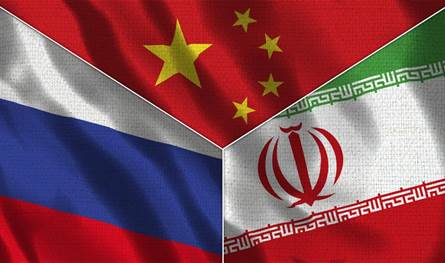Is there a Chinese-Russian-Iranian axis? A report by Middle East Eye answers


The British website “The Middle East Eye” stated that “the war on Gaza has placed the issue of Palestine at the forefront of global attention, and no major power is able to avoid dealing with this issue.” The idea that the Palestinian struggle could be buried under the Abraham Accords has been buried. The way China and Russia dealt with the repercussions of Gaza was beneficial to their foreign policies towards the Middle East. “Ultimately, Israel’s war on Gaza was a gift to Beijing and Moscow, given the ease with which they could highlight the West’s human rights hypocrisy.”
According to the website, “Hussein Ibish, a senior resident scholar at the Arab Gulf States Institute in Washington, said that the Palestinian issue is “useful” for China and Russia because it helps build their case against the international and regional order that it challenges. He added in an interview with the website that the issue makes it easier for the two powers to accuse the West of double standards “by emphasizing a system that is supposed to be rules-based and yet allows exceptions for particularly client states such as Israel, and against particularly unfavorable peoples such as the Palestinians.” But China and Russia did not help the Palestinian cause in tangible ways, and they could have done more to pressure Israel through economic and trade sanctions, severing diplomatic relations with Tel Aviv, joining other countries in the International Court of Justice, or imposing travel restrictions.”
The website continued, “Their national interests explain this inaction.” Simply put, Beijing and Moscow benefit in many ways from their multifaceted relationship with Tel Aviv, and regardless of all the death, destruction, and famine in Gaza, China and Russia seek to maintain their relations with Israel. “Both China and Russia have important trade relations with Israel,” Nader Hashemi, director of the Prince Alwaleed bin Talal Center for Muslim-Christian Understanding at Georgetown University, told the site. “They don’t want to disrupt that.”
Common interests
According to the website, “According to Mark Katz, a professor of politics at George Mason University, China and Russia have similar interests when it comes to Israel and the war in Gaza. In an interview with the website, he said: “Beijing wants to align itself with Arab and Islamic public opinion, but it also wants to maintain cooperation with Israel, which it values. However, this similarity in Russian and Chinese policy does not require coordination between them, but may simply be the result of each of them pursuing their own interests that largely coincide.” It is not surprising that the Kremlin seeks to maintain “relatively good relations” with Tel Aviv, considering that many influential Russian billionaires hold Israeli citizenship, Nikola Mikovic, a Belgrade-based political analyst, told the site.
The site continued, “In addition, with Moscow embroiled in the Ukraine quagmire, while the frozen conflict between Moldova and Transnistria threatens to collapse the stalemate, Russia cannot afford to become excessively involved in the war on Gaza, especially in light of the regional and international dimensions of the conflict.” For the Iranian-led “axis of resistance,” the war on Gaza is a wake-up call that China and Russia are not allies of Tehran and its allied groups, such as Hezbollah. Yun Sun, co-director of the East Asia Program at the Stimson Center, told the site that there is “a lot of hype” around the idea of a Sino-Russian-Iranian axis. She added: “Russia, China and Iran have some common interests, such as confronting American influence in the region. But they do not always share the same path. China does not believe in the strategy of chaos, and its oil imports actually depend on stability in the region.”
According to the site, “According to Katz, Moscow could have made it more difficult for Israel to strike Iranian and Hezbollah targets by “handing over more air defense assets to Syria, Iran, or Hezbollah, and/or letting it be known that Russian forces “It was integrated with fighters from Iran and Hezbollah” so that Israel would be vulnerable to Russian retaliation if it attacked either of them. For his part, Ibish said that Beijing, Moscow and Tehran “do not share an ideological vision, or even a set of interests that dictate joint responses to emerging crises.” Hence, it is a “wild exaggeration” to imagine that they form an alliance or a tripartite axis.”
The exchange rate of the dollar in Lebanon today, moment by moment
«Ibra’s role in the upcoming summer transfer period
[previous_post_link]






